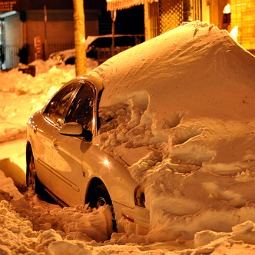[CLIPS]:
CORRESPONDENT: Schedule on the website, BBCNews.com, not much doubt about what people are clicking onto, and Thursday, most popular story, North America’s big freeze seen from space, Wednesday, North America temperature records tumble, Tuesday, North American Deep Freeze hits east [LAUGHS]. Monday, North America Shivers, Sunday…
BROOKE GLADSTONE: Two weeks ago, winter storm Hercules and this week the Polar Vortex, gave the media a massive frisson.
[CLIPS]:
CORRESPONDENT: Of course, we’ve been talking about the winter storm that they’ve named Hercules. This storm is expected to affect 100 million people across 22 states.
CORRESPONDENT: A major airline is going to shut down operations at some big US airports to give its system and its employees a chance to keep up with the cold.
CORRESPONDENT: If you’re under 30 years old, you probably never felt cold like this in your life.
[AUDIENCE LAUGHTER]
STEPHEN COLBERT: We're being hit by a polar vortex and thundersnow.
[LAUGHTER]
And, frankly, folks, I'm not sure if those are weather patterns or finishing moves from Mortal Kombat.
[LAUGHTER] [END CLIPS]
BROOKE GLADSTONE: Pontificators and politicians filled the jet stream with unbounded extrapolation. From Republican James Inhofe.
SEN. JAMES INHOFE: There`s been a concerted effort of
people to believe that global warming is taking place, that we`re all gonna die and all of that – it’s almost laughable.
BROOKE GLADSTONE: And Charlie Rose.
CHARLIE ROSE: Is it definitely connected to global warming?
BRYAN WALSH: Potentially, it's connected to that.
CHARLIE ROSE: Potentially.
BRYAN WALSH: These, these – these have been happening already.
BROOKE GLADSTONE: Rush Limbaugh.
RUSH LIMBAUGH: Right on schedule, the media had to come up with a way to make it sound like it's completely unprecedented. So no matter how they go at this, they're losing. They’re in the middle of a hoax and so they’ve created a polar vortex.
AL ROKER: Well, a lot of folks” have been saying there’s no such thing as a “polar vortex” and that it’s some left-wing media conspiracy.
BROOKE GLADSTONE: And Al Roker. Oh, wait, he shouldn’t be in this montage, he’s a weatherman. So he probably knows what he’s talking about.
AL ROKER: This is from my textbook from college, the Glossary of Meteorology from the Meteorological Society, copyright 1959, okay, right here – okay? “Polar vortex,” there it is. So for all the doubters out there, Stuff it!
BROOKE GLADSTONE: This cold winter has also been, in terms of the media, a silly season, filled with Holcomb, twaddle, drivel, bunkum, specifically what philosopher Harry Frankfurt would call “bull,” manure, so to speak. It’s a byproduct of our culture of blather, where, quote, “people are frequently impelled, whether by their own propensities or by the demands of others, to speak extensively about matters of which they are, to some degree, ignorant.” This, unplanned, turned out to be the theme of this week’s show.
BOB GARFIELD: Some of the hooey we address this hour is inadvertent, a byproduct of the attempt by its propagators to amuse the audience. Some of it may be intentional, an effort to mislead. But, in most cases, the audience participates in its own deception, especially perhaps when it comes to the weather. Andrew Revkin runs the Dot Earth blog at the New York Times.
ANDREW REVKIN: That tendency as a journalist and, of course, an audience, to gravitate toward the dramatic when it fits the world view is hard to fight back against. I even created a little emblem – it looks like a caution sign, a roadway sign, that I put on tweets, called single study syndrome, to sort of put a warning label when I’m writing about this pattern. And, by the way, this extends to everything from PCBs and farmed salmon to the latest thinking on coffee and health, to, of course, climate change.
BOB GARFIELD: If I, as a news consumer, read a story that says this proves global warming, this proves you should drink more coffee, this proves that you should not drink coffee, what happens to me?
ANDREW REVKIN: You end up with whiplash. I guarantee that that form of journalism, just going from one news peg to the next without building in the context, especially with science, which is all about context, the journey, you end up disengaging the very people who you should be trying to engage.
BOB GARFIELD: Over the last week or so, has there been any single story that made your head spin around like the kid in The Exorcist?
ANDREW REVKIN: Yeah, every time I heard “winter storm Hercules” I’d go, oh my God, there it is again, this is driving me crazy, because it was a pretty unremarkable storm, and the idea that these are somehow –
[BOB LAUGHING]
- as momentous as hurricanes, getting into the whole issue of whether the Weather Channel, you know, has the right to name a storm. There was a columnist who said he was just getting over sinus infection Fred, because he was so sick of winter storm Hercules.
[BOB LAUGHS]
I laughed out loud.
BOB GARFIELD: Andrew, thank you very, very much.
ANDREW REVKIN: It’s my pleasure. [LAUGHS]
BOB GARFIELD: Andrew Revkin teaches communications at Pace University and writes the Dot Earth blog for NYTimes.com.

